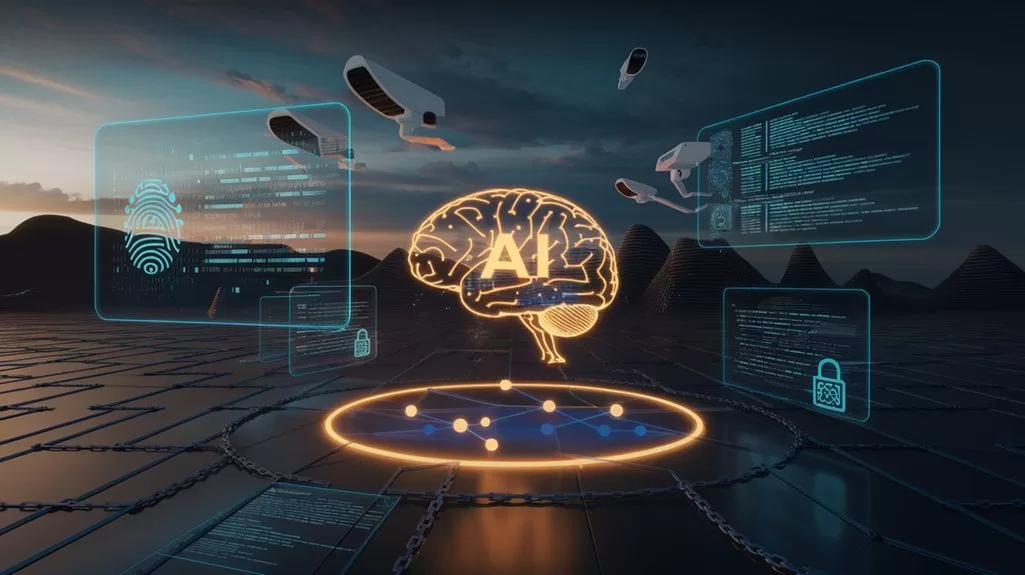OpenAI's gambit to redefine fair use with copyrighted materials for AI training is controversial. Advocates argue it's essential for advancing innovation and competitiveness. Critics, not so much. Publishers grumble, citing violations of intellectual property and unauthorized use. Privacy experts fret over transparent data practices. Meanwhile, regulatory bodies scramble to catch up. It's a profound, complex mess, intertwined with international stakes. Keen for more intrigue? There's plenty more to uncover in this heated saga.
Key Takeaways
- OpenAI's initiative to use copyrighted material for AI training raises ethical and legal concerns.
- Critics argue OpenAI's data practices challenge traditional notions of intellectual property rights.
- There is significant controversy over privacy, informed consent, and transparency in AI data collection.
- The debate highlights the tension between rapid AI innovation and the need for regulatory oversight.
- National security concerns emerge as restricted data access could impact global AI competitiveness.

Although the allure of artificial intelligence is undeniable, the controversies surrounding AI data practices are anything but glamorous. At the heart of these debates is OpenAI's audacious attempt to redefine fair use by scanning copyrighted material to train its AI models. The phrase "data ethics" has become a rallying cry for those concerned about privacy, bias, and the unchecked power of tech giants.
It's a messy, tangled web of copyright conflicts and ethical dilemmas. The stakes? Sky-high. Critics argue that OpenAI's approach to data collection challenges the very notion of intellectual property. Publishers, understandably, are up in arms. They worry their content is being snatched without permission, fueling AI models that could, ironically, reproduce similar content. Copyright conflicts here aren't just theoretical disputes. They're real, they're heated, and they're not going away anytime soon.
Privacy concerns also loom large. AI systems require vast amounts of data, often collected without users fully understanding the implications. Transparency, or the lack thereof, is a significant issue. How is the data collected? Who has access? Can anyone opt-out? These are questions that demand answers but often receive little more than vague assurances. Informed consent and opt-out options are essential to ensuring individuals' fundamental rights and privacy are respected.
Then there's the awkward dance between innovation and regulation. The rapid pace of AI advancements often strains existing legal and ethical frameworks. Various jurisdictions are scrambling to keep up, with some, like the EU, drafting thorough regulatory frameworks. But is it enough? Public backlash suggests otherwise. People are increasingly wary—distrustful of how their data might be used.
Bias is another ugly beast rearing its head. Training data can reflect societal prejudices, leading to discriminatory outputs. The irony? AI, hailed as the future of technological progress, can sometimes seem like a mirror reflecting our worst traits. It's a sobering thought: the technology of tomorrow, shaped by the biases of today. Amazon's AI Recruiting Tool Bias incident serves as a stark reminder of how historical data bias can impact AI algorithms, leading to discrimination.
The debate isn't confined to ethics and legality. It's also about global competitiveness. Countries like China are racing ahead in AI development. OpenAI argues that restricted access to data will hinder American AI innovation, highlighting the concerns about losing global competitiveness. Some argue that loosening copyright restrictions is vital for national security—an argument that adds a layer of urgency, and tension, to the discussion.
In the end, the battle for AI data isn't just about technology. It's a multifaceted conflict involving law, ethics, and international relations. The stakes are high, the players powerful.
And while the path forward is murky, one thing is clear: the conversation is only beginning. Prepare for more debates, more clashes, and more questions. Buckle up; it's going to be a bumpy ride.
References
- https://digitaldefynd.com/IQ/top-ai-scandals/
- https://www.pcgamer.com/hardware/if-you-dont-let-us-scrape-copyrighted-content-we-will-lose-out-to-china-says-openai-as-it-tries-to-influence-us-government/
- https://hai.stanford.edu/news/privacy-ai-era-how-do-we-protect-our-personal-information
- https://futurism.com/openai-over-copyrighted-work
- https://www.ibm.com/think/insights/ai-privacy









